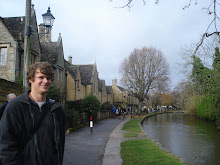Apparently and unfortunately, 20th Century German theologian Dietrich Bonhoeffer is often regarded as a disbeliever in the Resurrection of Christ, despite the many examples that would suggest the contrary. However, this post is not focused on whether or not one can consider him a Christian, since I am unaware of any serious objections to the fact. I would gladly welcome if anyone could point me in the direction of some primary source text, within its context.
Regardless, one may be thankful for the insight provided in Bonhoeffer's Ethics, the second section of "The Last Things and the Things Before the Last." Concerning the Christian's life, Bonhoeffer distinguishes between the ultimate and the penultimate; the former is the justification by grace and faith alone and the latter is the good works that follow from the ultimate.
How are these two related? One common approach is what Bonhoeffer calls "Radicalism." The radical only sees the ultimate; it disregards the penultimate. Radicalism hates what is established, such as creation (129). This is dangerous because it leads to bitterness, suspicion and contempt for men and the world (129); love is only extended to the "closed circle of the devout."
Bonhoeffer labels the other common approach a "Compromise." The compromise concentrates on the penultimate but ignores the ultimate. The way things are at the moment is what is of the most importance. "Compromise always springs from the hatred of the ultimate" (129). The world (creation) must "be protected against [the] encroachment on their territory" (129). Compromise hates the word, but Radicalism hates the real.
Neither of these approaches are correct but there is a solution and Bonhoeffer sees it in Christ. "In Jesus Christ there is neither radicalism nor compromise" (128). There are three reasons why Christ is the solution: 1) His Incarnation, 2) His Crucifixion, and 3) His Resurrection. The Incarnation shows us God's love for His creation, the Crucifixion shows us God's judgment on all flesh, and the Resurrection shows us God's will for a new world. As you can see, the Incarnation rejects radicalism and Christ's crucifixion and resurrection shows the error of a compromise. "There could be no greater error than to tear these three elements apart" (130), which Bonhoeffer thoroughly explains in more detail.
Being mindful of these three important aspects of Christ's life is a part of living one's life in God's will, where humanity's origin is recovered (34). Dante is right: " E'n la sua voluntade e nostra pace" (In His will is our peace) (Paradiso, Canto III, 85).
The page references are from this edition of Ethics.
Subscribe to:
Post Comments (Atom)

No comments:
Post a Comment